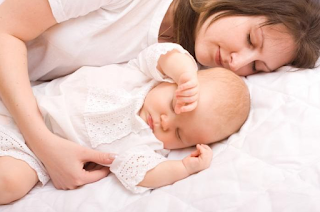Rest DURING INFANCY AND CHILDHOOD
Rest DURING INFANCY AND CHILDHOOD. During the initial three to four weeks following birth, the newborn rests extensively, waking only to satisfy its appetite. As this period concludes, periods of wakefulness gradually extend, leading to less frequent but longer sleep cycles.
It is crucial not to disturb the baby's early sleep patterns, allowing it to sleep undisturbed. However, after this initial period, efforts should be made to establish a regular sleep routine to prevent excessive daytime sleep and restless nights. The baby should be encouraged to nap before meals for about two hours. Sleeping at a later time may disrupt the night's sleep.
Initially, the baby should sleep with its parent to ensure adequate warmth, as its low body temperature and limited heat generation make this essential. If the baby experiences disturbed nights, it should be moved to a separate bed, cared for by another caregiver, and brought to the mother for breastfeeding early in the morning to preserve the mother's health.
After a month or a month and a half, a healthy baby can sleep alone in a crib or cradle, ensuring proper clothing, a warm room (around 60 degrees), and protection from drafts. It's crucial to maintain a warm room temperature, especially since a sleeping baby generates less heat.
For babies up to two years old, a feather bed is recommended, with a horsehair pillow introduced after the sixth month to keep the head cool during teething.
During childhood, up to the third or fourth year, a child should have a short nap before dinner. Afterward, napping may gradually be discontinued, but it is essential to acknowledge that more sleep is required during childhood compared to adulthood. A consistent bedtime between seven and eight is recommended, allowing the child to sleep undisturbed until the next morning.
While the required amount of sleep varies, maintaining a regular bedtime is crucial. Disturbing a child's sleep for personal reasons, such as late-night gatherings, can be detrimental to their health and well-being.
Once awake, a child should be encouraged to get up promptly to cultivate the habit of early rising, promoting mental and physical health. Sudden awakening from sleep should be avoided, as it can stimulate the brain and heart, potentially leading to serious consequences if repeated.
The child's bed should consist of a mattress rather than a feather bed during this stage to prevent excessive heat and potential health issues. It is also important to ventilate the room thoroughly by shaking the mattress and opening the window for a few hours each morning. Additionally, the child should not sleep with individuals in poor health or advanced age if possible, and ideally, they should sleep alone.
